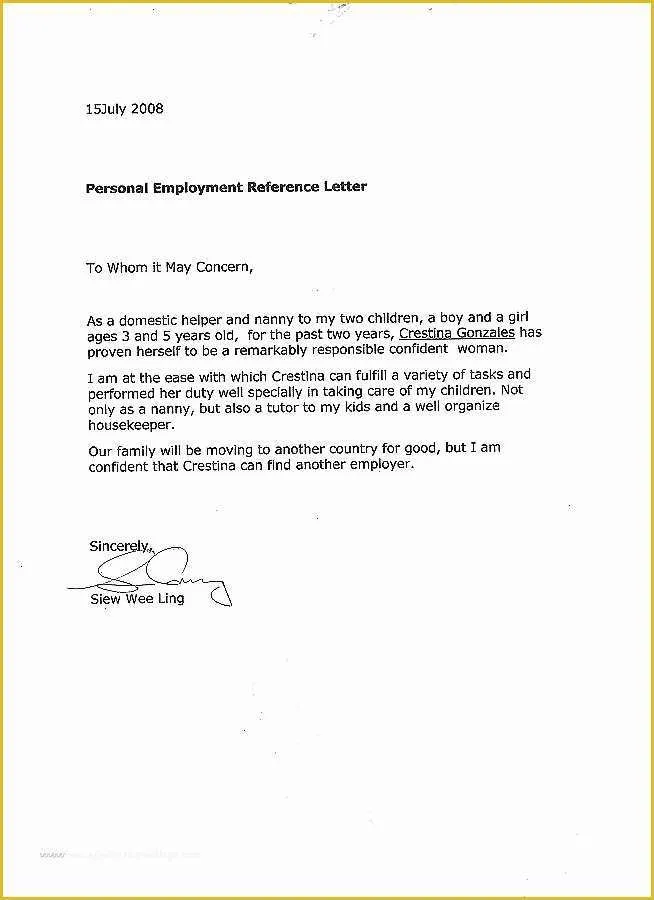Key Elements of a Caregiver Cover Letter
A well-crafted caregiver cover letter is your first chance to make a positive impression on a potential employer. It is a critical document that complements your resume and allows you to elaborate on your qualifications, skills, and experience in a more personal and detailed way. The best cover letters go beyond a simple recitation of your resume; they tell a story, demonstrating your passion for caregiving and your understanding of the specific needs of the role. This section explores the fundamental components that make a cover letter for a caregiver effective, helping you stand out from the competition and secure an interview.
Highlighting Your Skills and Experience
Your cover letter is your opportunity to showcase the skills and experience that make you a great caregiver. Begin by identifying the key skills that the employer is looking for in the job description, such as medication management, personal care, meal preparation, and companionship. Then, provide specific examples of how you have successfully utilized these skills in previous roles. This might involve describing the specific tasks you performed, the challenges you overcame, and the positive outcomes you achieved. When describing your experience, focus on the responsibilities that align with the job requirements, highlighting how your background makes you an ideal fit for the position. This approach will give the reader a clear picture of your capabilities.
Quantifying Achievements and Impact
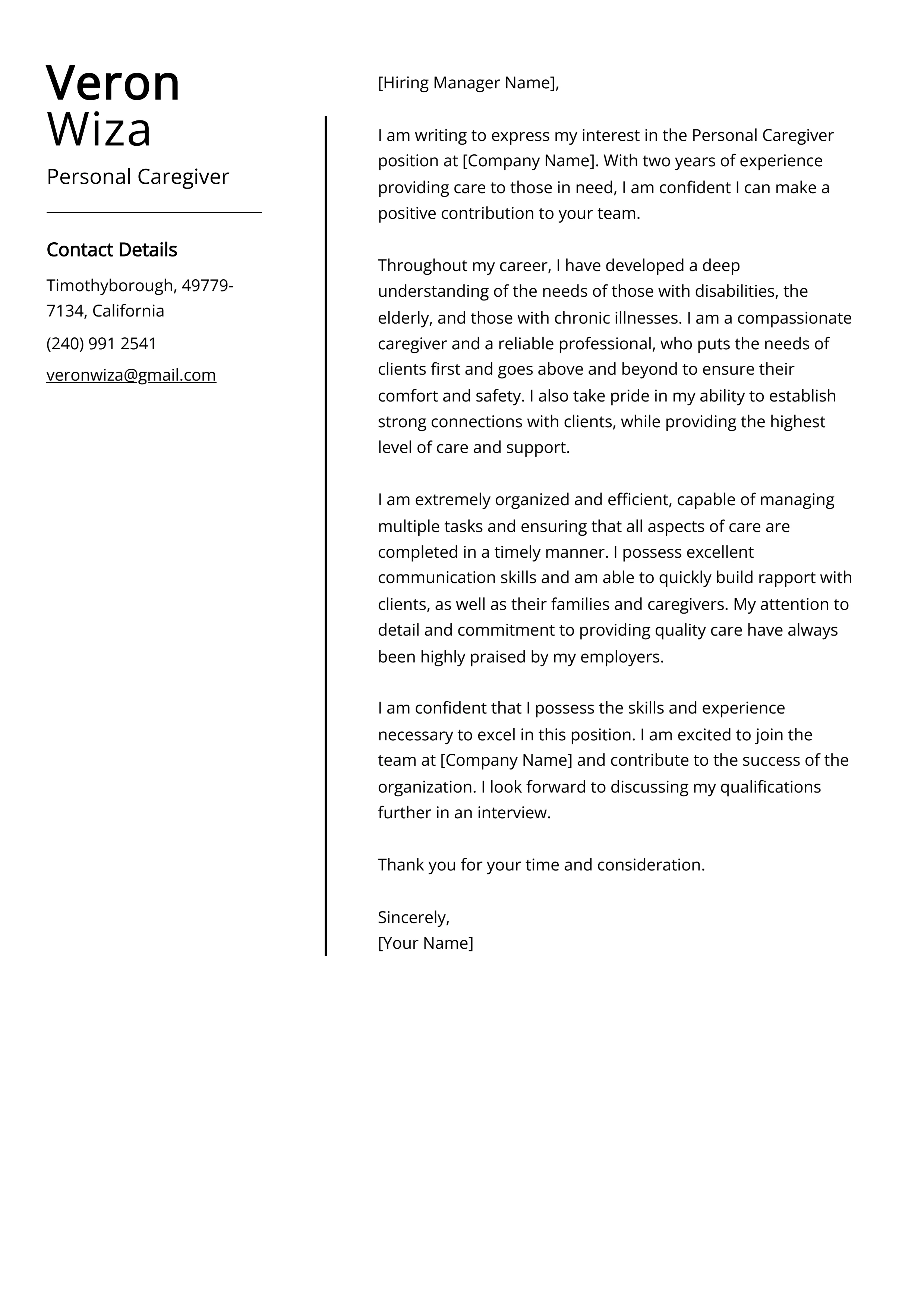
To make your experience even more compelling, quantify your achievements whenever possible. Instead of saying that you provided excellent care, provide concrete examples. For example, you might state that you administered medication to a specific number of patients daily, assisted with the rehabilitation of a certain number of patients, or that you were able to consistently improve the health of those under your care. Use numbers and statistics to illustrate the positive impact you have made in previous caregiving roles. By providing quantifiable evidence of your achievements, you demonstrate your ability to deliver tangible results and improve your chances of getting hired.
Tailoring Your Cover Letter to the Role
Every caregiving position is different, and your cover letter should reflect that. Customize your letter to match the specific requirements of each job for which you apply. This means carefully reviewing the job description and identifying the key skills, experience, and qualities the employer is seeking. When you do this, you can adjust your cover letter to highlight the most relevant information. By tailoring your letter, you demonstrate to the hiring manager that you are genuinely interested in the position and understand the needs of the organization or the individual in need of care. This is a critical step in showing that you are a great match.
Researching the Employer and the Needs
Before you write your cover letter, take the time to research the employer and the individual they are looking for to provide care. This could involve visiting the company’s website, reading online reviews, or looking at the website of the person who requires care. Understanding their values, mission, and specific care needs will enable you to tailor your letter to resonate with the employer. This research allows you to address the specific needs and expectations of the role, showing that you understand the requirements of the job and that you are prepared to provide the best possible care. This proactive approach can greatly enhance your cover letter.
Demonstrating Empathy and Compassion
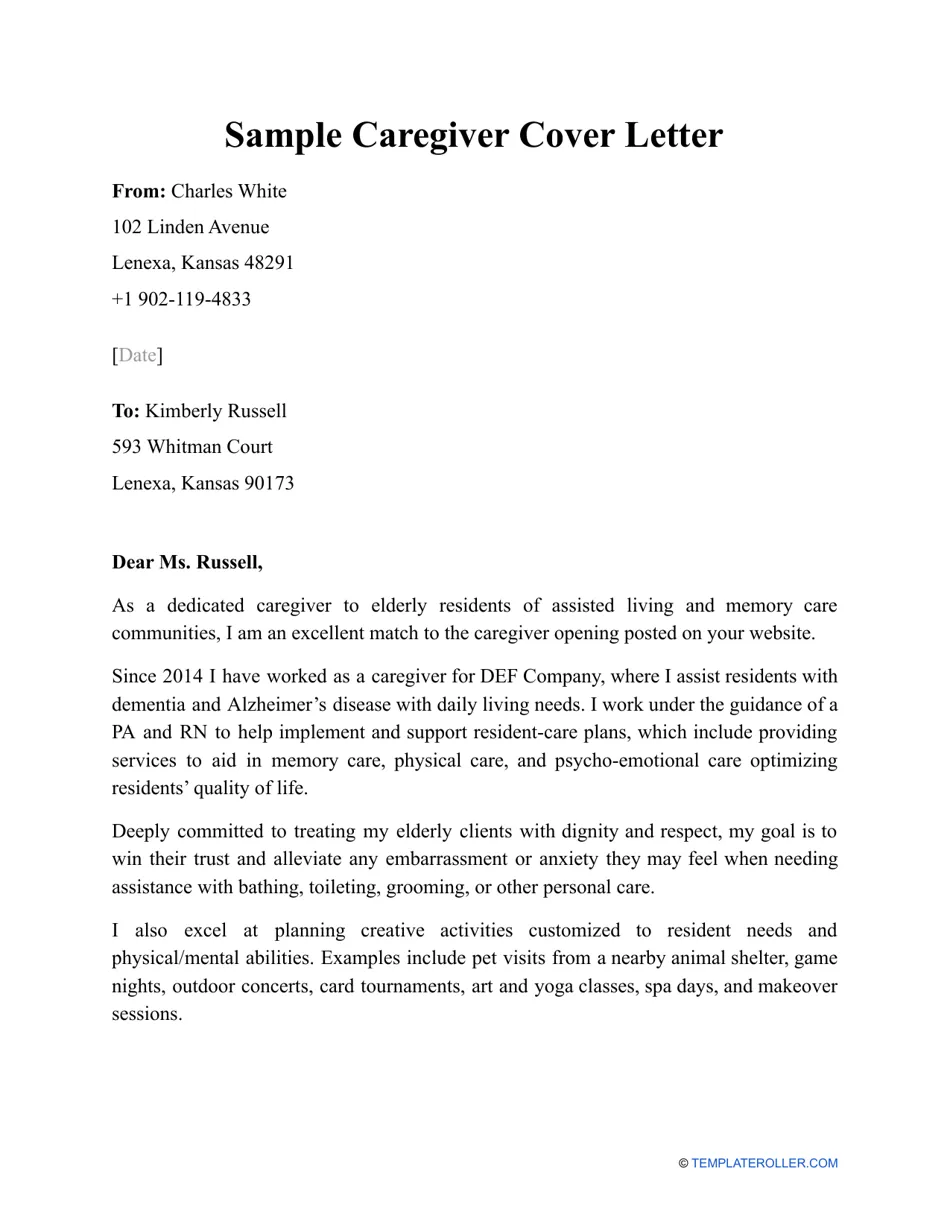
Caregiving is a profession that demands empathy and compassion, so your cover letter should reflect those qualities. Use language that conveys your genuine concern for the well-being of the person you will be caring for. Share a brief, relevant anecdote that illustrates your ability to connect with individuals on an emotional level and to provide comfort and support. This could involve describing how you assisted a previous patient with a difficult task or the way you improved their quality of life. By demonstrating your empathy and compassion, you show the employer that you are not only skilled but also that you have the emotional intelligence needed to succeed in this field.
Showcasing Your Personality
Your cover letter is an opportunity to let your personality shine through, but do so while staying professional. Your genuine character will help the employer to see how well you will fit in with the workplace or the individual needing care. Avoid sounding robotic or overly formal. Use a warm, approachable tone and let your enthusiasm for caregiving come through. It is okay to use personal pronouns like “I” and “me,” but keep the focus on the needs of the individual and the care you will provide. By allowing your personality to show, you will help the employer see who you are and how you can make a difference.
Using Personable Language
When it comes to personable language, the key is to find a balance between professionalism and warmth. Your cover letter should be well-written and free of errors, but it should also sound genuine and relatable. Instead of using overly formal phrases, opt for language that is friendly and conversational. For example, instead of saying “I am writing to express my interest,” you could say, “I am excited to apply for this role.” The best approach is to write as you would speak. This is an opportunity to show your personality and to connect with the employer on a personal level. Using such language makes your cover letter more engaging and memorable.
Making a Strong First Impression
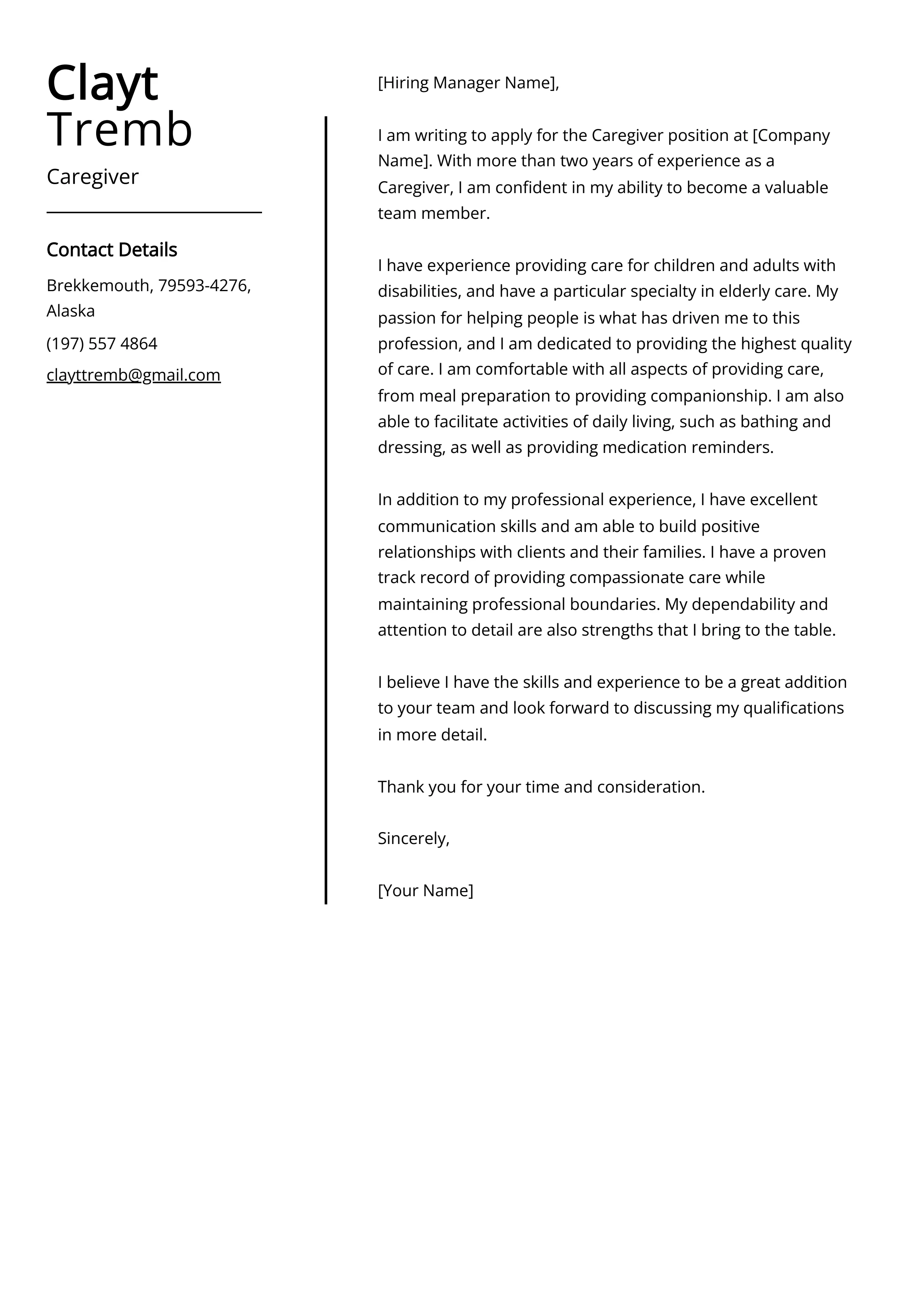
The first impression you make with your cover letter is crucial. The opening paragraph should grab the reader’s attention and make them want to learn more about you. State the position you are applying for and briefly mention how your skills and experience align with the job requirements. This is also a great opportunity to mention something specific that attracted you to the role or the organization. Avoid generic opening lines that could be used for any job. A strong introduction will set the tone for your letter and make the reader want to read on. The way you start your cover letter can be a defining element.
Formatting and Presentation
Presentation is extremely important. Your cover letter should be easy to read and visually appealing. Use a professional font, such as Times New Roman, Arial, or Calibri, and maintain a consistent font size throughout. Use clear headings and subheadings to break up the text and make it easier to scan. Ensure that your margins are consistent and that your paragraphs are properly aligned. Avoid using excessive colors or graphics, as they can distract from the content. If submitting a hard copy, make sure that the paper is of good quality and that your cover letter is free of smudges or errors. Well-formatted cover letters show that you care about the details and are willing to put in the effort.
Proofreading and Editing
Before you submit your cover letter, proofread it carefully. Errors in grammar, spelling, and punctuation can undermine your credibility and make a negative impression on the employer. Read through your letter multiple times, and ask someone else to review it as well. Use a grammar and spell-check tool, but do not rely on it exclusively, as these tools may not catch all errors. Take the time to ensure that your letter is error-free before submitting it, as this demonstrates that you are thorough and detail-oriented, both crucial skills for a caregiver.
Closing with Confidence
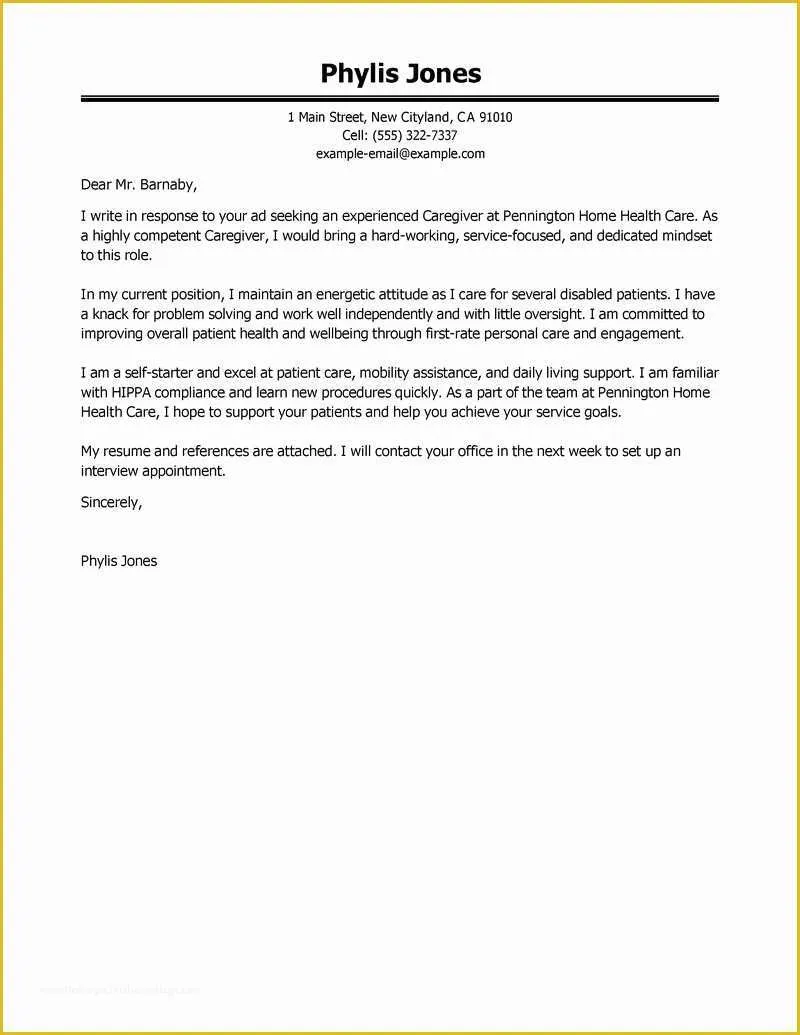
Your closing paragraph should reinforce your interest in the position and encourage the employer to contact you. Thank the employer for their time and consideration, and reiterate your enthusiasm for the role. Be sure to include a clear call to action, such as “I look forward to hearing from you soon” or “I am available for an interview at your earliest convenience.” Provide your contact information, including your phone number and email address, and ensure that it is up-to-date. Closing your cover letter on a confident note signals that you are eager to contribute your skills and experience to the position.
Expressing Enthusiasm and Availability
The closing paragraph is your last chance to leave a lasting impression, so express your enthusiasm for the position and state your availability for an interview. Instead of simply saying “Thank you for your time,” use more energetic phrasing such as “I am extremely excited about this opportunity.” If you are available for an interview, mention it directly, such as “I am available for an interview at your earliest convenience.” Expressing your enthusiasm and availability shows the employer that you are highly motivated and eager to get started. This is a critical element for a successful cover letter.
Action Verbs to Use in Your Cover Letter
Use action verbs to demonstrate your skills and experience. Action verbs help you create a dynamic cover letter, adding energy and impact to your descriptions. Examples of effective action verbs include “Administered,” “Assisted,” “Provided,” “Managed,” “Developed,” “Trained,” “Coordinated,” “Monitored,” and “Improved.” Using action verbs will help you paint a clear picture of your accomplishments. The use of strong action verbs makes your cover letter more engaging, which can help set you apart. Carefully choosing the correct verbs is paramount when describing your accomplishments.
Skills and Qualities
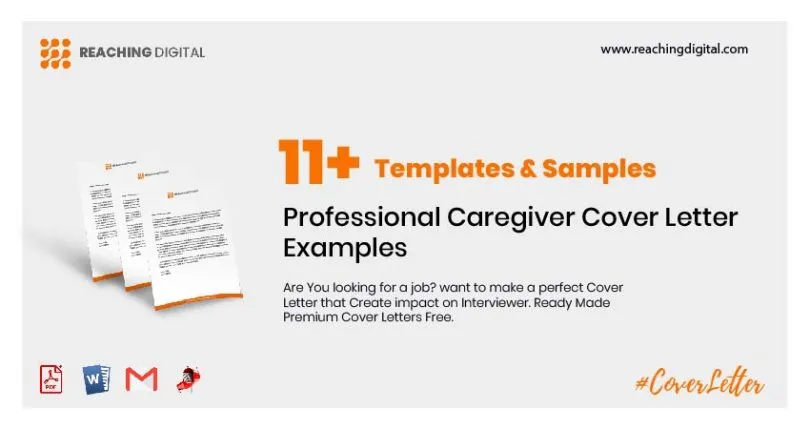
When writing your cover letter, it is essential to emphasize the skills and qualities that are most relevant to the job description. Caregiving requires a unique blend of both hard and soft skills. Make sure to showcase the skills and qualities the employer has listed in the job description. Demonstrate how you have used those skills in previous roles. By doing so, you show you are capable of providing what the role requires. This helps the employer envision you in the position and see you as a perfect fit.
Communication and Interpersonal Skills
Effective communication and interpersonal skills are essential for any caregiver. Highlight your ability to communicate clearly and respectfully with patients, their families, and other healthcare professionals. Provide examples of how you have resolved conflicts, built rapport with patients, and worked effectively as part of a team. Include phrases that highlight your listening skills and ability to provide emotional support. Show the employer you have the capacity to communicate in a way that is empathetic and helpful. Make sure your cover letter highlights your skill in fostering positive relationships.
Physical and Practical Skills
Caregiving often involves physical tasks such as assisting with mobility, administering medications, and providing personal care. If the job description lists specific physical requirements, be sure to highlight your relevant skills and experience. This could include your ability to lift and move patients, assist with bathing and dressing, or administer medications. It is extremely important to accurately present any physical skills and practical experience in your cover letter. These skills and experiences make you a great fit for the position.
